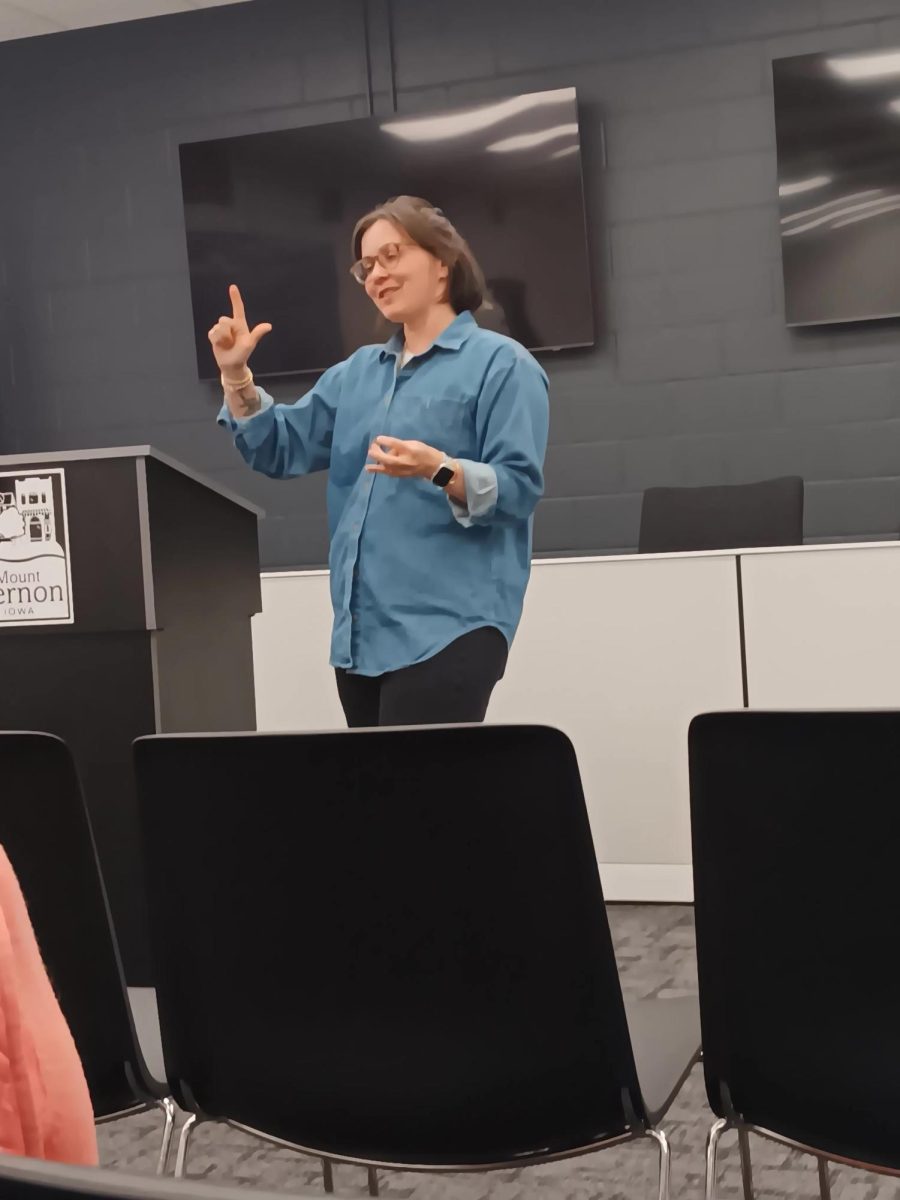The Mount Vernon-Lisbon unit of the League of Women Voters heard about voter registration efforts and community-building efforts throughout the state.
Shannon Brisbois, director of strategic community partnerships for VisionLeads, spoke about the efforts to increase voter registration and voting in districts in Iowa.
“The main goal for our organization is to build community,” Brisbois said. “We’ve been focusing on registering and getting precincts with less than 40 percent of turnout to increase voter turnout.”
Brisbois said a part of that is getting people comfortable talking about politics again. Part of that effort is that VisionLeads continues to show up in precincts multiple times during the year, so it wasn’t just an appearance there for a month to register.
Brisbois said the effort has helped in several Cedar Rapids and Des Moines communities, and they are looking to expand to communities like Sioux City in 2025.
“The hope is we get back to what we’ve done years ago, which is build communities,” Brisbois said. Brisbois said the goal is to have communities realize the power of their vote and voice in their community. VisionLeads trains volunteers on how to talk to people who are not registered to vote.
VisionLeads has seen hundreds of registered voters in Cedar Rapids and 400 in Des Moines since July of this year. The next step is getting people rides to the polls if they need assistance.
The League said they would be interested in knowing the unregistered numbers in Mount Vernon and Lisbon, but League member Marti Hurst noted the communities have great voter turnout in these communities. Megan Goldberg spoke about her recent efforts to increase voter registration and turnout at Cornell College.
“The college is legally obligated to help students register to vote,” Goldberg said.
While Cornell College has a high voter turnout for college students, Cornell’s turnout wasn’t as high. One of the challenges for students voting is determining where they want to vote.
“College students are one of the individuals who can choose either to vote at their home state or where the college is,” Goldberg said. “Many students prefer to vote at home.”
There are challenges for some absentee voting in other states that Goldberg said students are working to find solutions to in the next year.
College students are most likely to take part in other forms of political activity, like protests, but are less likely to participate in voting.
Part of that is one of the minor challenges for college students. One of those is knowing the address for their dorm rooms to register as a residence if they are voting in Iowa.
“These are also students learning life skills like how to mail something for the first time,” Goldberg said.
Voter I.D. laws also provide a potential barrier to entry for college students, as they don’t usually have pieces of mail that come to their college mailing address for proof of residence or a driver’s license with their dorm room on it.
“Those extra steps can be enough to derail college students,” Goldberg said.
The biggest issue is getting students to follow through on plans to vote.
“We are doing all we can to give students support on election day and get students out to actively vote,” Goldberg said.
Goldberg said she is discovering the best solution for all of this is to have college students organize fellow college students to
vote. This year, Goldberg’s class has taken 15 minutes of class time in 47 classes, which has led to 200 updated or new voter registrations.
There is also an on-campus voting location Wednesday, Oct. 30, from noon to 6 p.m.“Students will not have class that day, so that removes a barrier to voting,” Goldberg said.
Goldberg is working with residence life to get the appropriate forms to help students establish their proof of residency to eliminate that barrier to participation.
For students who don’t vote at the satellite voting location, having their polling location be the Mount Vernon City Hall is beneficial for students, as it is a walkable distance.
Goldberg said some of the efforts that helped with organizing students prior to COVID-19 have not returned since the pandemic, like active democratic or republican affiliated organizations. When it came to what the community can do to help, Goldberg said that advocating for items like same-day voter registration in Iowa or having student I.D.s be a recognizable form of voter identification at polls.
An idea that students have is the possibility of a community party location on voting nights to have something to encourage civic engagement with the civic action of voting.

